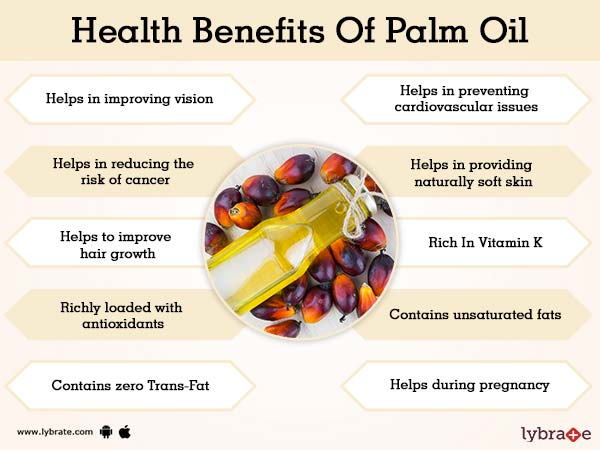Palm oil is found in a variety of foods. It is also a popular cooking oil and is used as an ingredient in cosmetics and detergents.
It has a bad reputation because it contains saturated fat, which increases cholesterol and triglyceride levels in the bloodstream and can lead to heart disease. It’s also linked to deforestation, as palm trees are often grown on former rainforest lands.
1. It’s high in saturated fat
Palm oil is a saturated fat that contributes to heart disease. It also contains palmitic acid, which can cause weight gain and slow down your metabolism.
Since the United States banned the addition of trans fats to foods, many manufacturers have used palm oil as a cheap substitute.
It is best to choose unprocessed, non-hydrogenated oils that are high in unsaturated fats – such as olive oil, canola oil and avocado oil. These healthy fats can lower cholesterol and triglyceride levels. They can also prevent oxidative damage to your blood plasma.
2. It’s a food allergen
Palm oil is popping up on food labels more and more as manufacturers seek alternatives to artificial trans fats. Girl Scout cookies, Pop Tarts, Kit Kat candy bars and many of Target’s branded foods contain palm oil, as do Cheerios, Nutri-Grain, and some Ben & Jerry’s ice creams.
Though better than butter or lard, palm oil still contains saturated fats and is low in heart-healthy monounsaturated and polyunsaturated fats. It can also cause allergic reactions. It’s best to avoid it when possible and choose products with sustainable sourcing.
3. It’s a carcinogen
Palm oil is the most popular vegetable oil in the world and used in many different foods, products and cosmetics. It is often touted as a healthier alternative to trans fats because it doesn’t contain the unhealthy saturated fat.
However, a recent study found that a fatty acid in palm oil, known as palmitic acid, promotes cancer cell spread, or metastasis. Additionally, to grow palm oil, old-growth forests are cleared away, destroying animal habitats and damaging the carbon storage sink of the planet.
4. It’s a fungicide
When the FDA banned trans fats, manufacturers turned to palm oil as a substitute. But this switch came at a cost.
To keep up with demand, old-growth forests have been slashed and burned to make way for plantations. This deforestation is harmful to wildlife habitats and contributes to global warming. It also threatens the survival of orangutans and other endangered species.
5. It’s a pesticide
Palm oil is a popular choice for processed foods and cosmetics because it’s cheap to produce. However, boycotting it will only lead to its replacement with other crops that require more farmland and cause deforestation.
When used in moderation, palm oil is healthy. It contains saturated fats, but also monounsaturated and polyunsaturated fats. It has a high smoke point and is rich in antioxidants. It’s also free of trans fat. However, its biggest drawback is that it comes from trees cut down for biofuel, destroying habitats and harming wildlife.
6. It’s a fertilizer
Palm oil is a popular cooking ingredient and replaces trans fats in almost every margarine, baked good, fried chicken product and frozen pizza sold today. It is also a common ingredient in cleaning products and personal care items like shampoo, soap and lotion.
The reason for its popularity is that it delivers a higher yield per hectare than most other vegetable oils. It can thrive in poor soils and succeed where other crops would fail. Its downside is that it drives deforestation. WWF is working to help governments regulate and support sustainable palm production.
7. It’s a fungicide
Palm oil (Elaeis guineensis) comes from the fruit of a tropical palm tree and is used in many different food products. It’s also used to make detergent, soap and cosmetics.
Because it is cheap to produce and has a high heat tolerance, it is the oil of choice for processed foods. It is found in nearly all packaged foods and a number of consumer goods, including deodorant, shampoo and toothpaste. However, consuming it can lead to high cholesterol and may even increase symptoms of malaria in some cases.
8. It’s a pesticide
When Europe banned unhealthy trans fats, manufacturers switched to palm oil as a cheap substitute. This vegetable-based oil is now ubiquitous and found in almost every processed food on the market.
In oil palm plantations, workers often refuse to report pesticide poisoning out of fear of retaliation or because they cannot afford the medical costs. They risk their lives, their livelihoods, and the welfare of their families and communities.
Mongabay’s investigation helped prosecutors secure a decision to investigate contaminated soil and water from the Brazilian palm oil company Biopalma (now BBF) in the Ture-Mariquita Indigenous Territory and surrounding production zones.
9. It’s a fungicide
Palm oil is a saturated fat that may pose risks to heart health. It’s also highly concentrated in Vitamin A and is rich in Vitamin E, which reduces the risk of cataracts, glaucoma, and skin cancer.
But the fungicide hexaconazole used on palm plantations is toxic to insects and wildlife. This has led to massive deforestation and habitat loss for endangered species in some of the most biodiverse parts of the world. That’s why it’s important to buy sustainable palm oil.
10. It’s a pesticide
As regulators around the world moved to ban unhealthy trans fats, manufacturers turned to palm oil as a natural replacement. Palm oil is free of trans fat and also contains tocotrienols, a type of vitamin E that has powerful antioxidant properties.
But while a little bit of this magical oil can make cookies crispier and soap bubble faster, it comes at a price to the environment and to people living in developing countries. If you’re going to consume it, look for a label that specifies it is sustainably-sourced.









